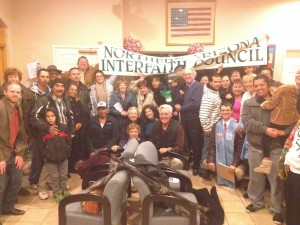
Members of the Northern Arizona Interfaith Council (NAIC) gather in Sedona on Dec. 10. The Sedona City Council approved a measure supporting comprehensive immigration reform. Courtesy photo.
SEDONA — The Sedona City Council voted on Dec. 10 to approve a resolution in support of comprehensive immigration reform, following the lead of the Flagstaff City Council, which approved a nearly identical resolution on Oct. 1, the Northern Arizona Interfaith Council (NAIC) reported in a media release.
The resolution calls on federal representatives to enact reform that reflects three basic principles: the essential economic role immigrants play as workers and taxpayers; the importance of family unity; and the need for a fair path to citizenship.
Sedona Vice-Mayor Mark DiNunzio and council members Barbara Litrell, Jessica Williamson, and John Martinez voted to support the bill. Mayor Rob Adams was not in attendance, due to illness. Council member Mike Ward recused himself from the discussion as a protest against the council getting involved in what he deemed partisan issues and member Dan McElroy voted against the resolution because it was not specific enough, the council reported. He moved to add a second resolution that would include the issues of border security and work visas, but no one seconded the proposal.
Approximately 60 supporters of the resolution, most identifying as members of the Northern Arizona Interfaith Council, attended the council session. Speakers representing congregations, businesses, and the wider community argued that the resolution would send a powerful message to Congress that the country cannot wait any longer for immigration reform. No one spoke against the resolution.
Sedona Chamber of Commerce President and CEO Jennifer Wesselhoff shared points from the chamber’s legislative policy agenda, which supports comprehensive immigration policy reform that “establishes a market-based immigration process to support a wide range of workforce needs and to respond quickly to the employment demands of US businesses.”
Nicole Rosas, director of Human Resources at Enchantment Resort, explained that Enchantment does everything they can to recruit local workers. Nonetheless, she said that the resort always has positions open that they are unable to fill.
Ron Martinez, president of Shrader-Martinez Construction, agreed with the pressing need for immigrant workers, but he primarily spoke from his experience as deacon of St. John Vianney Catholic Church.
“How easy it seems for politicians and individuals to dehumanize and objectify immigrants because they do not know them, calling them stealers of services, lawbreakers, aliens and worse,” Martinez said. “I know them as children of God as I am, and as my brother and sister who want to improve the lives of their families and communities.”
Vice-mayor DiNunzio acknowledged this in a very personal way.
“The treatment of our government has been abusive, and I apologize,” DiNunzio said.
Rev. Glenn Farley, minister of the Sedona Unitarian Universalist Fellowship, pointed to the fact that the Sedona economy is predominately service-based, built on the work of the immigrant community.
“I know that immigrants pick the food I eat from fields, prepare the food I eat when I go out to local restaurants, clean my home, clean my car, landscape and garden around my home, and built my home,” he said. “Viewed another way, without the immigration community, I would be starved and malnourished, I would live in filth, surrounded by weeds, and be homeless without shelter.”
Farley pointed out that the day of the vote, Dec. 10, was the 65th anniversary of the adoption of the Universal Declaration of Human Rights, and he called on the council to honor human rights day by saying “yes to human dignity and yes to common decency.”
Also speaking at the meeting was Rabbi Alicia Magal of the Jewish Community of Sedona and the Verde Valley. Rabbi Magal, along with other members of NAIC, also participated in Arizona Speaks, a statewide assembly for immigration reform in late November, when she signed her name to a list of reform supporters to be published in several Arizona newspapers.
After the council meeting, she shared that, as the daughter of a Holocaust survivor, this had been a difficult step.
“The idea of being on a list was scary, because in the past one’s name on ‘a list’ meant danger, roundup, incarceration, death,” Magal said. “And yet, I had to see that this is now in a free country, and I have every right to add my name to a letter that asks for what is a human right. We must never forget that we were all ‘strangers’ in a foreign land. Although I did have a few moments of tears and felt a bit shaky, I did add my name proudly to the letter.”
